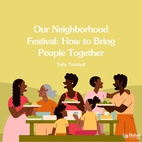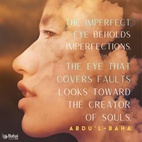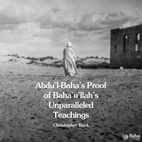The views expressed in our content reflect individual perspectives and do not represent the authoritative views of the Baha'i Faith.
A person will worship something – have no doubt about that. We may think our tribute is paid in secret in the dark recesses of our hearts – but it will out. That which dominates our imaginations and our thoughts will determine our lives and our character. Therefore, it behooves us to be careful what we worship, for what we are worshipping we are becoming. – Ralph Waldo Emerson
Worship none but God, and, with radiant hearts, lift up your faces unto your Lord, the Lord of all names. – Baha’u’llah, The Most Holy Book, p. 48.
A few months ago I took a walk, and happened to pass an Apple Computer store. Outside the closed store, I saw a line of people on the sidewalk that stretched around the block. The people at the front of the line rested in lawn chairs, and a few even had tents and makeshift shelters. Two guys at the front of the line were cooking burgers on a portable charcoal grille outside their tent.

“Wow, what a line,” I said to one of the people standing there. “What’s it for?”
“The new iPhone 6,” she said, with a tone of disbelief in her voice that suggested I had just arrived on a slow boat from a very backward and uncivilized country.
“Whoa,” I said, “how long have you been waiting?”
“Four days,” she told me.
“Why?” I asked.
“We’re Apple worshippers,” she said with a smile. Those were her exact words. I don’t think she was making a Biblical allusion to that well-known apple in Genesis, either.
What do you worship?
The word worship used to be reserved for the love of God. But in today’s society, people use it to indicate a deep devotion to sports teams, celebrities, nations, political ideologies and even consumer brands. Some worship status, success, fame, money, nature or physical beauty. Some even worship certain attitudes: ironic detachment, coolness, a hipster outlook, a musical style.
Sociologists have written extensively about this transference of worshipfulness, suggesting that it may come from an innate, inner human need to devote our lives to something larger than ourselves; combined with the increasing lack of religion in some cultures. Instead of worshipping God, we substitute other earthly things.
We worship whatever has become most important in our lives.
Historically, of course, this has happened before:
In brief, Moses… founded the law of God, purified the morals of the people of Israel and gave them an impetus toward nobler and higher attainments. But after the departure of Moses, following the decline of the glory of Solomon’s era and during the reign of Jeroboam there came a great change in this nation. The high ethical standards and spiritual perfections ceased to exist. Conditions and morals became corrupt, religion was debased, and the perfect principles of the Mosaic law were obscured in superstition and polytheism. War and strife arose among the tribes, and their unity was destroyed. The followers of Jeroboam declared themselves rightful and valid in kingly succession, and the supporters of Rehoboam made the same claim. Finally, the tribes were torn asunder by hostility and hatred, the glory of Israel was eclipsed, and so complete was the degradation that a golden calf was set up as an object of worship in the city of Tyre. Thereupon God sent Elijah, the prophet, who redeemed the people, renewed the law of God and established an era of new life for Israel. – Abdu’l-Baha, The Promulgation of Universal Peace, pp. 406-407.
“The Sin of the Calf,” the story from Exodus about the veneration of the Golden Calf, has become a metaphor that aptly describes the contemporary urge to worship materialistic idols like wealth or worldly achievement. The Book of Mathew personifies this tendency with Mammon, the Biblical symbol for greed and materialism:
Lay not up for yourselves treasures upon earth, where moth and rust doth corrupt, and where thieves break through and steal: But lay up for yourselves treasures in heaven, where neither moth nor rust doth corrupt, and where thieves do not break through nor steal: For where your treasure is, there will your heart be also. No man can serve two masters: for either he will hate the one, and love the other; or else he will hold to the one, and despise the other. Ye cannot serve God and mammon. – Matthew 6:19–21, 24.
All of the world’s great Faiths warn us against this same human inclination to substitute anything temporal, ephemeral and material for that which lasts forever:
O friend, the heart is the dwelling of eternal mysteries, make it not the home of fleeting fancies; waste not the treasure of thy precious life in employment with this swiftly passing world. Thou comest from the world of holiness — bind not thine heart to the earth; thou art a dweller in the court of nearness — choose not the homeland of the dust. – Baha’u’llah, The Seven Valleys, p. 35.
Calling us to the eternal world of the soul, Baha’u’llah asks us to worship only God. But Baha’u’llah’s writings also say, in many different places, that God is unknowable. How can we worship something we can’t know?
We’ll try to tackle that enormous paradox in tomorrow’s essay in this series.

















Comments
Sign in or create an account
Continue with Googleor